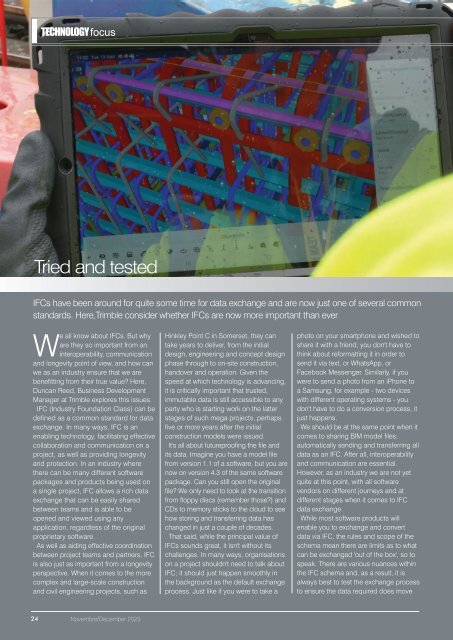CC2311
Create successful ePaper yourself
Turn your PDF publications into a flip-book with our unique Google optimized e-Paper software.
TECHNOLOGY focus<br />
Tried and tested<br />
IFCs have been around for quite some time for data exchange and are now just one of several common<br />
standards. Here,Trimble consider whether IFCs are now more important than ever<br />
We all know about IFCs. But why<br />
are they so important from an<br />
interoperability, communication<br />
and longevity point of view, and how can<br />
we as an industry ensure that we are<br />
benefitting from their true value? Here,<br />
Duncan Reed, Business Development<br />
Manager at Trimble explores this issues.<br />
IFC (Industry Foundation Class) can be<br />
defined as a common standard for data<br />
exchange. In many ways, IFC is an<br />
enabling technology, facilitating effective<br />
collaboration and communication on a<br />
project, as well as providing longevity<br />
and protection. In an industry where<br />
there can be many different software<br />
packages and products being used on<br />
a single project, IFC allows a rich data<br />
exchange that can be easily shared<br />
between teams and is able to be<br />
opened and viewed using any<br />
application, regardless of the original<br />
proprietary software.<br />
As well as aiding effective coordination<br />
between project teams and partners, IFC<br />
is also just as important from a longevity<br />
perspective. When it comes to the more<br />
complex and large-scale construction<br />
and civil engineering projects, such as<br />
Hinkley Point C in Somerset, they can<br />
take years to deliver, from the initial<br />
design, engineering and concept design<br />
phase through to on-site construction,<br />
handover and operation. Given the<br />
speed at which technology is advancing,<br />
it is critically important that trusted,<br />
immutable data is still accessible to any<br />
party who is starting work on the latter<br />
stages of such mega projects, perhaps<br />
five or more years after the initial<br />
construction models were issued.<br />
It's all about futureproofing the file and<br />
its data. Imagine you have a model file<br />
from version 1.1 of a software, but you are<br />
now on version 4.3 of the same software<br />
package. Can you still open the original<br />
file? We only need to look at the transition<br />
from floppy discs (remember those?) and<br />
CDs to memory sticks to the cloud to see<br />
how storing and transferring data has<br />
changed in just a couple of decades.<br />
That said, while the principal value of<br />
IFCs sounds great, it isn't without its<br />
challenges. In many ways, organisations<br />
on a project shouldn't need to talk about<br />
IFC; it should just happen smoothly in<br />
the background as the default exchange<br />
process. Just like if you were to take a<br />
photo on your smartphone and wished to<br />
share it with a friend; you don't have to<br />
think about reformatting it in order to<br />
send it via text, or WhatsApp, or<br />
Facebook Messenger. Similarly, if you<br />
were to send a photo from an iPhone to<br />
a Samsung, for example - two devices<br />
with different operating systems - you<br />
don't have to do a conversion process, it<br />
just happens.<br />
We should be at the same point when it<br />
comes to sharing BIM model files,<br />
automatically sending and transferring all<br />
data as an IFC. After all, interoperability<br />
and communication are essential.<br />
However, as an industry we are not yet<br />
quite at this point, with all software<br />
vendors on different journeys and at<br />
different stages when it comes to IFC<br />
data exchange.<br />
While most software products will<br />
enable you to exchange and convert<br />
data via IFC, the rules and scope of the<br />
schema mean there are limits as to what<br />
can be exchanged 'out of the box', so to<br />
speak. There are various nuances within<br />
the IFC schema and, as a result, it is<br />
always best to test the exchange process<br />
to ensure the data required does move<br />
24<br />
November/December 2023

















